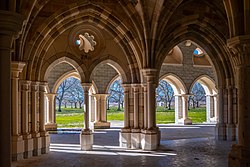Vina (Spanish: Viña, meaning "Vine") is a census-designated place (CDP) in Tehama County, California.[2] Vina sits at an elevation of 210 feet (64 m).[2] The 2010 United States census reported Vina's population was 237.
Vina | |
|---|---|
 | |
| Coordinates: 39°56′01″N 122°03′09″W / 39.93361°N 122.05250°W | |
| Country | |
| State | |
| County | Tehama |
| Area | |
• Total | 1.352 sq mi (3.501 km2) |
| • Land | 1.352 sq mi (3.501 km2) |
| • Water | 0 sq mi (0 km2) 0% |
| Elevation | 210 ft (60 m) |
| Population | |
• Total | 198 |
| • Density | 150/sq mi (57/km2) |
| Time zone | UTC-8 (Pacific (PST)) |
| • Summer (DST) | UTC-7 (PDT) |
| ZIP Code | 96092 |
| Area code | 530 |
| GNIS feature ID | 2628796 |
| U.S. Geological Survey Geographic Names Information System: Vina, California | |
Vina is the location of the Roman Catholic Trappist Abbey of New Clairvaux.[4]
History
editHiram Good, "Indian hunter", homesteaded in Lower Deer Creek, later Vina, filing Proof of Claim in the Marysville office on February 4, 1857.[5]
Lower Deer Creek became Vina in the 1860s when a winery was founded. It derives its name from the Spanish-language word meaning "vineyard".[6] A post office has been in operation at Vina since 1871.[7]
Beginning in 1881, railroad industrialist and former governor Leland Stanford bought land in and around Vina, which he developed into a huge ranch of 55,000 acres (22,000 hectares). It included what was at the time the largest vineyard in the world — 4,000 acres (1,600 hectares) growing 3 million vines. The ranch also grew fruit, vegetables, and grain, along with hundreds of horses, cattle, and hogs. His wines were not successful, and he turned to producing medicinal brandy instead. The village grew with the ranch; at its height Vina had a population of 1,300 and boasted two hotels and five saloons.[8] After Stanford's death his widow Jane Stanford tried to maintain the ranch, keeping it until 1898 or later.[8]
On July 1, 1955, a property known as the Flynn Ranch was sold to Gethsemani Abbey and became the site of the Vina Monastery. In 1959 it became the Abbey of New Clairvaux.[9]
Geography
editAccording to the United States Census Bureau, the CDP covers an area of 1.4 square miles (3.5 km2), all of it land.
Demographics
editThe 2010 United States Census[10] reported that Vina had a population of 237. The population density was 175.3 inhabitants per square mile (67.7/km2). The racial makeup of Vina was 195 (82.3%) White, 1 (0.4%) African American, 7 (3.0%) Native American, 2 (0.8%) Asian, 0 (0.0%) Pacific Islander, 20 (8.4%) from other races, and 12 (5.1%) from two or more races. Hispanic or Latino of any race were 42 persons (17.7%).
The Census reported that 203 people (85.7% of the population) lived in households, 34 (14.3%) lived in non-institutionalized group quarters, and 0 (0%) were institutionalized.
There were 70 households, out of which 29 (41.4%) had children under the age of 18 living in them, 39 (55.7%) were opposite-sex married couples living together, 11 (15.7%) had a female householder with no husband present, 5 (7.1%) had a male householder with no wife present. There were 3 (4.3%) unmarried opposite-sex partnerships, and 0 (0%) same-sex married couples or partnerships. 10 households (14.3%) were made up of individuals, and 5 (7.1%) had someone living alone who was 65 years of age or older. The average household size was 2.90. There were 55 families (78.6% of all households); the average family size was 3.20.
The population was spread out, with 49 people (20.7%) under the age of 18, 21 people (8.9%) aged 18 to 24, 61 people (25.7%) aged 25 to 44, 55 people (23.2%) aged 45 to 64, and 51 people (21.5%) who were 65 years of age or older. The median age was 40.9 years. For every 100 females, there were 125.7 males. For every 100 females age 18 and over, there were 129.3 males.
There were 76 housing units at an average density of 56.2 per square mile (21.7/km2), of which 51 (72.9%) were owner-occupied, and 19 (27.1%) were occupied by renters. The homeowner vacancy rate was 3.8%; the rental vacancy rate was 9.5%. 152 people (64.1% of the population) lived in owner-occupied housing units and 51 people (21.5%) lived in rental housing units.
See also
edit- Ishi, last known member of the Yahi people of the Yana people of the Native Americans in the United States
References
edit- ^ "U.S. Census". Archived from the original on February 20, 2011. Retrieved December 19, 2012.
- ^ a b c U.S. Geological Survey Geographic Names Information System: Vina, California
- ^ "Explore Census Data". data.census.gov. Retrieved May 12, 2023.
- ^ Greenberg, Peter (October 2, 2007). The Complete Travel Detective Bible: The Consummate Insider Tells You What You Need to Know in an Increasingly Complex World. Rodale. p. 156. ISBN 978-1-59486-708-8.
- ^ Burrill, Richard (2010). Historical and Archaeological Investigation of the Hi Good Cabin Site. Anthro Company. ISBN 978-1-878464-26-2.
- ^ "Place Names" (PDF). p. 56. Archived from the original (PDF) on May 8, 2017. Retrieved March 25, 2018.
- ^ "Post Offices". Jim Forte Postal History. Retrieved March 26, 2018.
- ^ a b De Wolk, Roland (2019). American Disruptor: The Scandalous Life of Leland Stanford. University of California Press. pp. 140–43, 187–88. ISBN 9780520383234.
- ^ "The History of the Abbey of New Clairvaux, Vina, California" (PDF). Sacramento Diocesan Archives. Retrieved July 4, 2023.
- ^ "2010 Census Interactive Population Search: CA - Vina CDP". U.S. Census Bureau. Archived from the original on July 15, 2014. Retrieved July 12, 2014.
